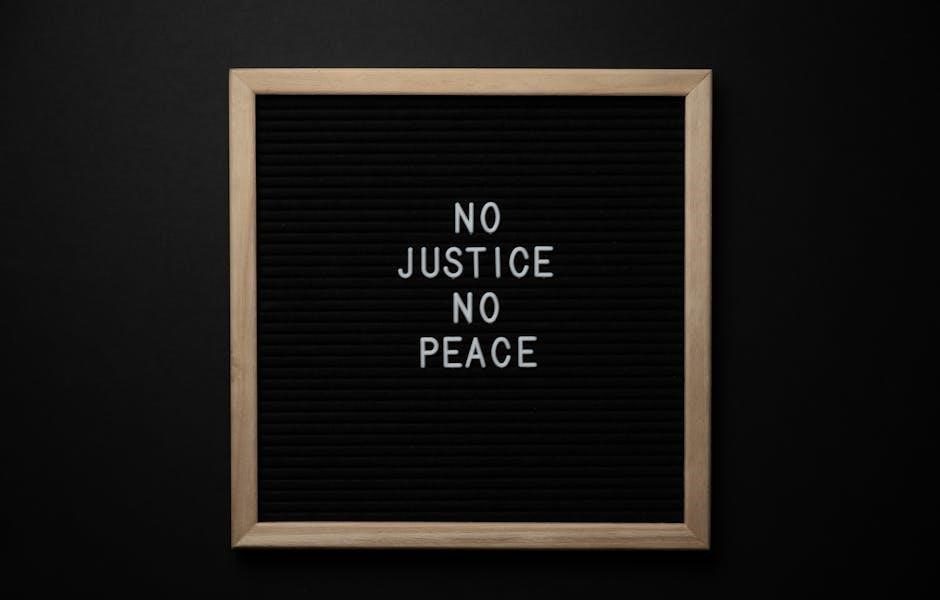
justice what is the right thing to do pdf
Justice: Exploring the Right Thing to Do
Justice, at its core, delves into the complex question of how individuals should be treated fairly. It is about determining the proper course of action within interactions, fostering fairness for all involved.

The philosophical exploration of justice begins with ancient thinkers like Plato and Aristotle, who laid the groundwork for understanding its nature and connection to happiness. Justice, derived from the Latin “jus” meaning right or law, stands as a vital moral and political concept. It demands fairness, equity, and the fulfillment of one’s due, often seen as synonymous with fairness.
Philosophical discussions delve into various definitions, theories, and implications, examining fairness, ethics, and moral reasoning. Throughout history, philosophers have wrestled with questions of justice in society. Key takeaways emphasize justice as a cornerstone virtue, underpinning moral and political discourse. It’s a necessary virtue in interactions and a principal virtue of institutions.
The concept prompts continuous debate. Justice, in its broadest sense, ensures individuals are treated fairly, reflecting a constant will to render each their due. Examining justice offers insights into contemporary debates, fostering a deeper understanding of its role in shaping our world.
Defining Justice: Core Concepts

Defining justice involves grappling with its multifaceted nature, a challenge that has occupied philosophers for centuries; At its heart, justice is often understood as the principle that individuals should be treated fairly, a concept deeply intertwined with ethics and moral philosophy. The core of justice lies in ensuring balance and fairness in interactions and relationships.
One fundamental concept is the idea of giving each person what they deserve, or what is due to them. This encompasses both benefits and burdens, reflecting a proper proportion between one’s merits and their experiences. Justice demands that similar cases be treated similarly, preventing arbitrariness and ensuring consistency in its application.

Furthermore, justice requires an agent, be it an individual, a group, or an institution, to actively ensure fairness. This agent must possess the will to alter circumstances and uphold the principles of justice. Ultimately, defining justice means striving for equity and upholding moral standards in all aspects of society.
Justice as Fairness and Equity
Justice is often closely associated with fairness and equity, yet these terms are not always interchangeable. Fairness implies impartiality and equal treatment, while equity acknowledges that different individuals may require different approaches to achieve just outcomes. Justice as fairness strives to eliminate arbitrariness and ensure that everyone has equal opportunities.
Equity, on the other hand, recognizes that historical and social disadvantages may necessitate differentiated treatment to level the playing field. It focuses on addressing systemic inequalities and providing resources or support where needed to ensure everyone can fully participate in society. Balancing fairness and equity is crucial in achieving true justice.
A just society must consider both the principles of equal treatment and the need to address disparities. This involves creating policies and practices that promote fairness while also accounting for the unique circumstances of individuals and groups. By prioritizing both fairness and equity, we can create a more just and inclusive society for all.
Historical Perspectives on Justice
The concept of justice has been a central theme in philosophical and political thought for centuries. Examining historical perspectives provides valuable insights into how societies have understood and pursued justice across different eras. From ancient Greece to the Middle Ages, thinkers have grappled with defining justice and its role in shaping social order.
Ancient philosophers like Plato and Aristotle laid the groundwork for Western conceptions of justice, emphasizing fairness, virtue, and the common good. Roman legal traditions further developed these ideas, emphasizing natural law and the importance of rendering each person their due. Medieval thinkers, such as St. Augustine, integrated religious perspectives, viewing justice as divinely ordained and linked to moral principles.
These historical perspectives highlight the evolving nature of justice and the diverse influences that have shaped its meaning. By understanding these historical roots, we can better appreciate the complexities of contemporary debates surrounding justice and its application in modern society.
Ancient Philosophers: Plato and Aristotle
Plato and Aristotle, towering figures of ancient Greek philosophy, profoundly shaped our understanding of justice. Plato, in his seminal work “The Republic,” explored justice as a virtue of both the individual and the state. He argued that a just society is one where each part fulfills its proper role, guided by reason and wisdom.
Aristotle, Plato’s student, further refined the concept of justice. He distinguished between distributive and corrective justice, emphasizing the importance of fairness and equity in both the allocation of resources and the rectification of wrongs. Aristotle believed that justice involves treating like cases alike and ensuring that individuals receive what they deserve.
Both philosophers viewed justice as essential for a well-ordered society and a flourishing human life. Their ideas continue to resonate today, providing a foundation for contemporary debates about fairness, rights, and the pursuit of the good.
Roman and Medieval Influences
The Roman Empire, inheriting Greek philosophical traditions, significantly shaped the concept of justice through its legal system. Roman lawyers, influenced by Greek philosophy, emphasized natural law, arguing that justice is inherent and independent of human consent. Cicero, a prominent Roman lawyer, championed justice as a natural law, advocating for its universal application.

During the medieval period, St. Augustine integrated Christian theology with classical philosophical ideas. He viewed justice as divinely ordained, emphasizing its connection to morality and the pursuit of the common good. Thomas Aquinas, another influential medieval philosopher, considered justice preeminent among moral virtues, aligning with Aristotle’s analysis of particular justice.
These Roman and medieval thinkers built upon the foundations laid by the Greeks, further developing the understanding of justice as both a legal and moral imperative, influencing subsequent Western thought.
Theories of Justice
Various theories attempt to define justice and its application. One prominent perspective is “justice as mutual advantage,” which posits that rules of justice stem from rational agreements where individuals seek self-interest. This theory suggests that justice arises from a pragmatic understanding that cooperation benefits all parties involved.
Another significant theory is “justice as a social contract.” This viewpoint suggests that justice is based on a hypothetical agreement among members of a society, outlining the rights and responsibilities of each individual. John Rawls’ “justice as fairness” falls under this category, emphasizing equality and fairness in the distribution of resources and opportunities.
These theories offer differing perspectives on the foundations of justice, highlighting the complexities in determining what constitutes a fair and equitable society. They provide frameworks for analyzing and evaluating social institutions and practices.

Justice as Mutual Advantage
Justice as mutual advantage proposes a pragmatic perspective, suggesting that the principles of justice arise from a rational agreement among individuals pursuing their self-interests. This theory posits that individuals recognize the benefits of cooperation and agree to abide by certain rules to achieve mutual gains.
The core idea is that justice is not based on altruism or moral ideals, but rather on a calculated assessment of the advantages that can be derived from cooperation. By adhering to rules that promote mutual benefit, individuals can achieve outcomes that are superior to those they could achieve in a state of conflict or competition.
This approach to justice emphasizes the role of rationality and self-interest in shaping social norms and institutions. It suggests that justice is a product of strategic interaction, where individuals negotiate and compromise to create a system that serves their collective interests. This theory offers a distinct perspective on the foundations of justice.
Justice as a Social Contract
Justice as a social contract offers a compelling framework for understanding the foundations of a just society. This theory posits that principles of justice are derived from an agreement, either explicit or implicit, among individuals to establish a social order. Imagine individuals in a hypothetical “original position,” where they are tasked with designing the rules of their society.

In this initial state, these individuals are behind a “veil of ignorance,” unaware of their future social status, talents, or personal characteristics. This ensures impartiality, as they must create rules that are fair to all members of society, regardless of their individual circumstances.
The resulting social contract, according to this theory, embodies the principles of justice that should govern society. It emphasizes fairness, equality, and the protection of individual rights, providing a basis for a just and well-ordered community that prioritizes the common good.
Key Elements of Justice
Justice, as a multifaceted concept, relies on several key elements to ensure fairness and equity within a society. One fundamental element is treating like cases alike, demanding consistency in the application of rules and laws. This principle dictates that individuals in similar situations should receive similar treatment, preventing arbitrary or discriminatory outcomes.
Another crucial element involves the consideration of deserts and entitlements. Deserts refer to what individuals deserve based on their actions, contributions, or merits. Entitlements, on the other hand, are rights or claims that individuals possess, either by law or moral principle. A just system recognizes and respects both deserts and entitlements, ensuring that individuals receive what they are due.

Furthermore, justice necessitates an agent, whether an individual, a group, or an institution, to administer and uphold its principles. This agent must possess the will and authority to alter circumstances, ensuring that justice is served and that individuals are held accountable for their actions, promoting a fair and equitable society for all.

Treating Like Cases Alike
At the heart of justice lies the principle of treating like cases alike, a cornerstone of fairness and impartiality. This concept dictates that individuals in similar situations should be treated in a similar manner, ensuring consistency and preventing arbitrary decisions. It demands that decision-makers apply the same rules and standards to all, regardless of personal biases or prejudices.
When like cases are treated differently, it undermines the very foundation of justice, leading to perceptions of unfairness and inequality. This principle serves as a safeguard against discrimination and ensures that everyone is subject to the same standards of conduct. By adhering to this tenet, societies can foster trust, promote equality, and uphold the principles of fairness for all their members.
Moreover, consistently applying this principle helps ensure that the legal system is predictable and transparent, enabling individuals to understand their rights and obligations. It is fundamental for maintaining social order and promoting a just and equitable society.
The Role of Deserts and Entitlements
Deserts and entitlements play a crucial role in shaping our understanding of justice, influencing how we determine what individuals are due. Deserts refer to what people deserve based on their actions, efforts, or contributions. This perspective suggests that individuals should receive benefits or burdens in proportion to their merit, rewarding positive behavior and discouraging harmful actions. The concept is closely linked to ideas of fairness and individual responsibility.
Entitlements, on the other hand, are rights or claims that individuals possess, often based on membership in a particular group or society. These can include basic human rights, legal protections, or social welfare provisions. Justice, in this context, involves ensuring that individuals receive their due entitlements, regardless of their personal characteristics or achievements.

Balancing deserts and entitlements is a complex task, as these two concepts may sometimes conflict. Determining the appropriate weight to give each factor is a central challenge in constructing just and equitable social systems, reflecting different philosophical approaches.
Justice and Moral Philosophy
Justice stands as a cornerstone within moral philosophy, serving as a fundamental principle guiding ethical considerations. Moral philosophy delves into questions of right and wrong, seeking to establish frameworks for moral conduct. Justice, in this context, addresses how individuals should interact with one another to ensure fairness and equity.
Theories of justice within moral philosophy often explore the nature of moral obligations and the criteria for determining just outcomes. Philosophers grapple with defining the essence of justice, examining whether it lies in maximizing overall well-being, upholding individual rights, or adhering to principles of fairness.
Furthermore, moral philosophy investigates the relationship between justice and other moral values, such as compassion, honesty, and respect. It examines how these values intersect and potentially conflict, requiring individuals and societies to make difficult choices. Ultimately, the intersection of justice and moral philosophy seeks to provide a robust framework for ethical decision-making and the pursuit of a morally sound society, defining the very fabric of human interaction.
Justice and Political Philosophy
Justice occupies a central position in political philosophy, shaping the structure and legitimacy of political institutions. Political philosophy explores the nature of the state, the rights and responsibilities of citizens, and the principles that should govern the distribution of power and resources. Justice, in this context, addresses the fundamental question of how a society should be organized to ensure fairness and equality for all its members.
Theories of justice within political philosophy often examine the role of government in promoting just outcomes, considering issues such as distributive justice, procedural justice, and social justice. Philosophers debate the extent to which the state should intervene in the economy to redistribute wealth, protect vulnerable populations, and ensure equal opportunities.
Moreover, political philosophy investigates the relationship between justice and other political values, such as liberty, equality, and democracy. It explores how these values can be reconciled and prioritized in the pursuit of a just society. Ultimately, the intersection of justice and political philosophy seeks to provide a framework for creating political institutions that uphold the rights and dignity of all citizens, fostering a society based on principles of fairness.
Contemporary Debates Surrounding Justice
Justice remains a subject of intense debate in contemporary society, with numerous complex issues sparking ongoing discussions. One key area of contention revolves around distributive justice and the fair allocation of resources. Differing perspectives exist on the extent to which wealth should be redistributed, the role of government intervention, and the impact of economic inequality on social justice.
Another prominent debate concerns criminal justice reform and the treatment of marginalized communities within the legal system. Discussions often center on issues such as racial bias, police brutality, mass incarceration, and the effectiveness of rehabilitation programs. These debates highlight the need for systemic changes to ensure equal treatment and fairness for all individuals, regardless of their background.
Furthermore, contemporary debates surrounding justice encompass global issues such as climate change, human rights, and international law. Discussions address the responsibilities of nations to address global challenges, the protection of vulnerable populations, and the pursuit of justice across borders. These debates underscore the interconnectedness of justice issues and the need for collaborative solutions to promote fairness and equity on a global scale.
Justice as a Virtue
Justice, beyond its role as a societal principle, is also considered a virtue – a character trait that embodies moral excellence. When viewed as a virtue, justice reflects an individual’s commitment to fairness, equity, and upholding moral standards in their interactions with others. It signifies a disposition to act justly, even when it may be personally challenging or disadvantageous.
Cultivating justice as a virtue involves developing a deep sense of empathy, understanding, and respect for the rights and needs of others. It requires individuals to act impartially, avoiding biases and prejudices that could lead to unfair treatment. A just person strives to give each individual what they deserve, ensuring that everyone is treated with dignity and compassion.
Furthermore, justice as a virtue involves a commitment to upholding the law and promoting social harmony. It encourages individuals to actively challenge injustice, advocate for the marginalized, and work towards a more equitable society. By embracing justice as a virtue, individuals contribute to a more just and compassionate world, fostering trust, cooperation, and mutual respect among all members of society.
Related Posts

nursing portfolio examples pdf
Need a nursing portfolio that *wows*? Explore incredible PDF examples, get inspired, and land your dream job! Downloadable templates & expert tips inside. **Nursing portfolio** success starts here!

unravel me free pdf
Dive into the captivating world of ‘Unravel Me’! Get your free PDF download now and experience Maren Montgomery’s intense story. Perfect for YA dystopian fans!

wednesday wars book pdf
Download the ‘Wednesday Wars’ book PDF for free! Journey back to 1969 with Holling Hoodhood – a story full of laughs, challenges, and unexpected growth. Get your PDF now!